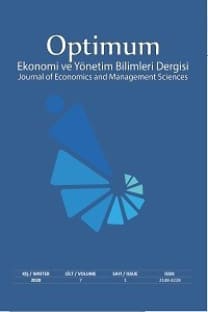A Review on Hotel Employees within the Context of General & Organizational Cynicism
A Review on Hotel Employees within the Context of General & Organizational Cynicism
Cynicism Organizational Cynicism, General Cynicism, Tourism Sector,
___
Abraham, R. (2000). Organizational Cynicism: Bases and Consequences, Genetic, Social, and General Psyhology Monographs, 126, (3), pp: 269- 292.Andersson, L. M., (1996), Employee Cynicism: An Examination Using a Contract Violation Framework, Human Relations, 49, 11, ss:1395-1418.
Andersson, L. M., Bateman & Thomas S.,(1997), Cynicism in The Workplace: Some Causes and Effects, Journal of Organizational Behavior, Vol: 18, pp: 449-469.
Arslan, E. T., (2012), Süleyman Demirel Üniversitesi İktisadi ve İdari Bilimler Fakültesi Akademik Personelinin Genel ve Örgütsel Sinizm Düzeyi, Doğuş Üniversitesi, 13(1), ss:12-27.
Bommer, W., Rich, G. A. & Rubin, R. S., (2005), Chaning Attitudes About Change: Longitudinal Effects of Transformational Leader Behavior on Employee Cynicism About Organizational Change, Journal of Organizational Behavior, 26, pp:733-753.
Brandes, P. M., (1997), Organizational Cynicism: Its Nature, Antecedents, and Consequences, (Dissertation of Doctor of Philosohy), The University Cincinnati.
Davis, W. D., Gardner, W. L., (2004), Perceptions of Politics and Organizational Cynicism: An Attributional and Leader–Member Exchange Perspective, The Leadership Quarterly 15, pp: 439-465.
Dean, J. W., Brandes, P & Dharwadkar, R, (1998), Organizational Cynicism, Academy of Management Review, Vol:23, No:2, pp: 341- 352.
Eaton, J. A., (2000), A Social Motivation Approach To Organizational Cynicism, (Dissertation of Master of Arts), Psychology York University, Toronto.
Efilti, S., Gönen, Y. Ö. ve Ünal Ö, F.,(2008), Örgütsel Sinizm: Akdeniz Üniversitesi’nde Görev Yapan Yönetici Sekreterler Üzerinde Bir Alan Araştırması, 7. Ulusal Büro Yönetimi ve Sekreterlik Kongresi, ss:279-290.
Erdost, H. E., Karacaoğlu, K, ve Reyhanoğlu, M., (2007) Örgütsel Sinizm Kavramı ve İlgili Ölçeklerin Türkiye’deki Bir Firmada Test Edilmesi, 15. Ulusal Yönetim ve Organizasyon Kongresi Bildiri Kitabı, Sakarya Üniversitesi, ss: 514-5
Gökberk, M., (1999), Felsefe Tarihi, Remzi Kitabevi, İstanbul.
Hançerlioğlu, O., (1995), Düşünce Tarihi, Remzi Kitabevi, 6. Basım, İstanbul.
James, M. S. L., (2005), Antecedents and Consequences of Cynicism in Organizations: An Examination of The Potential Positive and Negative Effects on School Systems, (Dissertation of Doctor of Philosohy), The Florida State University College of Business.
Johnson, J. L. & O’leary- Kelly, A., (2003), The Effects of Psychological Contract Breach and Organizational Cynicism: Not All Socail Exchange Violations are Created Equal, Journal of Organizational Behavior, 24, pp: 6276
Kutanis, R Ö. ve Çetinel, E., (2010), Adaletsizlik Algısı Sinizmi Tetikler mi? Bir Örnek Olay, Dumlupınar Üniversitesi Sosyal Bilimler Dergisi, Sayı:26, ss:186- 195.
Mantere, S. & Martinsuo, M, (2001), Adopting and Questioning Strategy: Exploring The Roles of Cynicism and Dissert, http://www.strada.tkk.fi/documents/Mantere_and_Martinsuo.pdf , pp:1-25. (Erişim Tarihi: 29.03.2013)
Mete, Y. A., (2013), Relationship Between Organizational Cynicism And Ethical Leadership Behaviour: A Study At Higher Education, Social and Behaviorial Sciences 89, ss: 476-483.
Nair, P. & Kamalanabhan, T.J., (2010) The Impact of Cynicism on Ethical Intentions of Indian Managers: The Moderating Role Of Seniority, Journal of International Business Ethics, Vol:3, No:1, pp:14-29.
Naus, F., Itorson, A. & Roe, R., (2007), Organizational Cynicism: Extending The Exit, Voice, Loyalty, and Neglect Model of Employees’ Responses to Adverse Condition in The Workplace, Human Relations, Vol: 60, Iss: 5, pp: 6837
Tokgöz, N. ve Yılmaz, H., (2008), Örgütsel Sinisizm: Eskişehir ve Alanya’daki Otel İşletmelerinde Bir Uygulama, Anadolu Üniversitesi Sosyal Bilimler Dergisi, Vol:8, Sayı: 2, ss: 283-305.
Treadway, D, Hochwarter, W A., Ferris, G R., Kacmar, C J., Douglas, C., Ammeter, A. P., Buckley, M. R., (2004), Leader Political Skill and Employee Raction, The Leadership Quarterly, 15, pp:493-513.
Watt, J D., Piotrowski, C, (2008), Organizational Change Cynicism: A Review of The Literature and Intervention Strategies, Organizational Development Journal, Vol:26, Number3, pp:23-31.
- Yayın Aralığı: 2
- Başlangıç: 2014
- Yayıncı: -
Non-performing Loans in Turkish Banking Sector and Macro Economic Effects
Alparslan Şahin GÖRMÜŞ, Vasfi KAHYA
Remark on the Causes of Traffic Accidents and Traffic Awareness: Examples of Usak Province
Ercan ÖZEN, Erhan GENÇ, Zübeyde KAYA
A Review on Hotel Employees within the Context of General & Organizational Cynicism
Fulya Misirdali YANGİL, Metin BAŞ, Seval AYGÜN
Kapak, Kurullar ve Bibliyografik Bilgi
A Review on Hotel Employees within the Context of General & Organizational Cynicism
Fulya Misirdali YANGİL, Metin BAŞ, Seval AYGÜN
Güler ÖNDER, Meryem AYBAS, Emrah ÖNDER
The Evaluation of Impacts on Business Performance of the Knowledge Leadership
